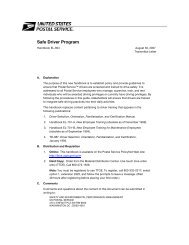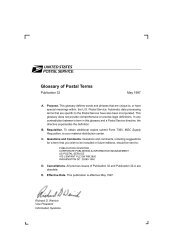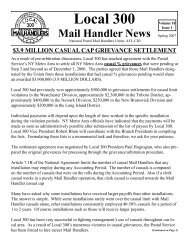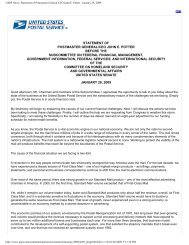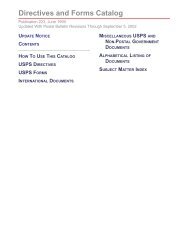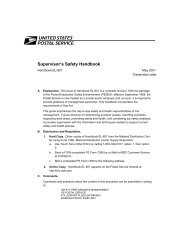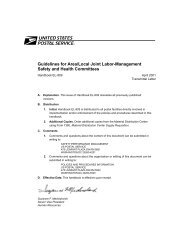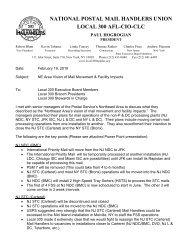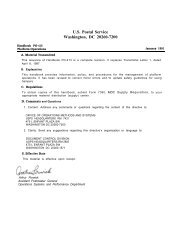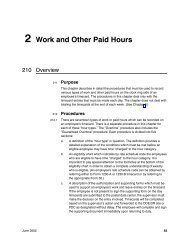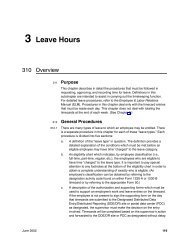Employee's Guide to Understanding Sexual Harassment - Local 300 ...
Employee's Guide to Understanding Sexual Harassment - Local 300 ...
Employee's Guide to Understanding Sexual Harassment - Local 300 ...
Create successful ePaper yourself
Turn your PDF publications into a flip-book with our unique Google optimized e-Paper software.
EMPLOYEE’S GUIDE TO<br />
UNDERSTANDING<br />
SEXUAL HARASSMENT<br />
September 2001<br />
Publication 553
Employee’s <strong>Guide</strong> <strong>to</strong> <strong>Understanding</strong> <strong>Sexual</strong> <strong>Harassment</strong><br />
Dear Postal Service Employee:<br />
The United States Postal Service wants you <strong>to</strong><br />
know that sexual harassment will not be <strong>to</strong>lerated<br />
in the workplace. Publication 553 will help you<br />
learn about sexual harassment. This is important<br />
because the only way <strong>to</strong> achieve a workplace free<br />
of such behavior is <strong>to</strong> make sure everyone knows<br />
what it is and what <strong>to</strong> do about it when it happens.<br />
You, as an employee, have <strong>to</strong> do your part. Read<br />
and become familiar with this guide and report<br />
improper behavior.<br />
The Supreme Court has ruled that sexual<br />
harassment is improper and unlawful. <strong>Sexual</strong><br />
harassment also undermines employee morale.<br />
The law requires employers <strong>to</strong> take reasonable<br />
steps <strong>to</strong> end sexual harassment in the workplace.<br />
If you feel you are being sexually harassed, report<br />
it <strong>to</strong> your immediate supervisor, another<br />
supervisor, or someone who can do something<br />
about it. Help is available, but you have <strong>to</strong> do your<br />
part by reporting it.<br />
Read the guide. Know your rights. Take<br />
responsibility.<br />
John E. Potter<br />
Postmaster General, CEO<br />
Publication 553, September 2001
Employee’s <strong>Guide</strong> <strong>to</strong> <strong>Understanding</strong> <strong>Sexual</strong> <strong>Harassment</strong><br />
Postal Service Policy on <strong>Sexual</strong><br />
<strong>Harassment</strong><br />
The United States Postal Service is committed <strong>to</strong><br />
providing a work environment free of sexual<br />
harassment and inappropriate sexual conduct. The<br />
Postal Service’s workforce must be one in which<br />
all employees are treated with dignity and respect<br />
by supervisors, subordinates, and coworkers.<br />
There is no place in the Postal Service’s workplace<br />
for sexually intimidating, embarrassing, or coercive<br />
behavior.<br />
<strong>Sexual</strong> harassment is against the law. Employees<br />
will be subject <strong>to</strong> disciplinary action, up <strong>to</strong> and<br />
including removal, for engaging in sexually<br />
harassing behavior such as, but not limited <strong>to</strong>:<br />
Making or threatening <strong>to</strong> make employment<br />
decisions based on an employee’s submission <strong>to</strong><br />
or rejection of sexual advances or requests for<br />
sexual favors.<br />
Deliberate or repeated unsolicited remarks with a<br />
sexual connotation or physical contacts of a<br />
sexual nature that are unwelcome <strong>to</strong> the<br />
recipient.<br />
Behavior that creates a sustained hostile or<br />
abusive work environment so severe or<br />
pervasive that it unreasonably interferes with or<br />
changes the conditions of one’s employment.<br />
Although not every instance of inappropriate<br />
sexual behavior may fit the legal definition of<br />
sexual harassment, such behavior in the<br />
workplace undermines morale and violates the<br />
Postal Service’s standards of conduct. Disciplinary<br />
action may result even if the conduct is not sexual<br />
harassment under the law. The Postal Service<br />
owes its employees a safe, productive, and<br />
inclusive workplace and can <strong>to</strong>lerate nothing less.<br />
Postal Service employees who believe they are<br />
the victims of sexual harassment or inappropriate<br />
sexually based conduct or who have witnessed<br />
inappropriate conduct of a sexual nature should<br />
Publication 553, September 2001
Employee’s <strong>Guide</strong> <strong>to</strong> <strong>Understanding</strong> <strong>Sexual</strong> <strong>Harassment</strong><br />
bring the situation <strong>to</strong> the attention of a manager,<br />
supervisor, union official, an Equal Employment<br />
Opportunity (EEO) counselor, or the manager of<br />
Human Resources.<br />
All managers and supervisors are responsible for<br />
preventing sexual harassment and inappropriate<br />
behavior in the workplace and must respond<br />
promptly when they learn of any such conduct.<br />
Any manager or supervisor who receives a<br />
complaint will see that a prompt and thorough<br />
investigation is conducted and ensure that the<br />
harassment/inappropriate conduct does not<br />
happen again. The Initial Management Inquiry<br />
Process materials available in Publication 552,<br />
Manager’s <strong>Guide</strong> <strong>to</strong> <strong>Understanding</strong> <strong>Sexual</strong><br />
<strong>Harassment</strong>, should be used by all managers and<br />
supervisors when a complaint is brought <strong>to</strong> their<br />
attention. If sexual harassment or inappropriate<br />
conduct is found, managers must take prompt and<br />
appropriate remedial action.<br />
In addition, employees can seek relief through the<br />
EEO complaint process, grievance arbitration<br />
procedures established through the collective<br />
bargaining agreements with the unions, and the<br />
nonbargaining grievance procedures described in<br />
section 650 of the Employee and Labor Relations<br />
Manual (ELM). Employees pursuing an EEO<br />
complaint must contact an EEO counselor within<br />
45 days of the act(s) giving rise <strong>to</strong> the claim in<br />
order <strong>to</strong> preserve their rights under federal law.<br />
Any possible criminal misconduct should be<br />
reported <strong>to</strong> the Postal Inspection Service.<br />
Retaliation against employees who raise a claim of<br />
sexual harassment, report inappropriate conduct,<br />
or provide evidence in any investigation is illegal<br />
and can result in disciplinary action.<br />
The Postal Service will not <strong>to</strong>lerate sexual<br />
harassment, any inappropriate sexual conduct, or<br />
reprisal in the workplace.<br />
Publication 553, September 2001
Employee’s <strong>Guide</strong> <strong>to</strong> <strong>Understanding</strong> <strong>Sexual</strong> <strong>Harassment</strong><br />
What You Should Know About<br />
<strong>Sexual</strong> <strong>Harassment</strong><br />
You have a right <strong>to</strong> work in an environment<br />
free of sexual harassment.<br />
The only way <strong>to</strong> achieve a workplace free of<br />
sexual harassment is <strong>to</strong> make sure that every<br />
employee knows what <strong>to</strong> do about it when it<br />
happens.<br />
You can help identify and s<strong>to</strong>p sexual harassment<br />
in the workplace:<br />
Do not ignore sexual teasing, jokes, remarks, or<br />
questions.<br />
Do not condone harassment by participating or<br />
remaining silent.<br />
Ask the person or persons doing the harassing<br />
<strong>to</strong> s<strong>to</strong>p.<br />
Report harassing behavior <strong>to</strong> your immediate<br />
supervisor, another supervisor, or someone else<br />
who can do something about it (e.g., a manager,<br />
union official, an EEO counselor, or the manager<br />
of Human Resources).<br />
Those in authority have the responsibility <strong>to</strong> see<br />
that a prompt and thorough investigation is<br />
conducted and <strong>to</strong> remedy the situation.<br />
Help is available. Do your part. Take<br />
appropriate action.<br />
What <strong>Sexual</strong> <strong>Harassment</strong> Is<br />
Although a familiar term, sexual harassment is not<br />
always easy <strong>to</strong> define. Issues of “he said–she<br />
said” abound, and behavior that seems harmless<br />
<strong>to</strong> some is perceived as offensive by others.<br />
Nonetheless, over the years, a number of<br />
principles have become well established and offer<br />
guidance as <strong>to</strong> what can constitute a sexual<br />
harassment claim.<br />
Publication 553, September 2001
Employee’s <strong>Guide</strong> <strong>to</strong> <strong>Understanding</strong> <strong>Sexual</strong> <strong>Harassment</strong><br />
<strong>Sexual</strong> harassment can cover a wide array of<br />
behaviors. It can consist of words, actions, or,<br />
most often, a combination of the two. It can range<br />
from the display of sexist car<strong>to</strong>ons <strong>to</strong> the crime of<br />
rape. It includes obvious things such as an<br />
invitation <strong>to</strong> have sex in exchange for favors or<br />
unwelcome intimate <strong>to</strong>uching, patting, or grabbing.<br />
Yet it can also include less obvious behaviors such<br />
as repeated comments about a person’s<br />
appearance. Other behaviors such as brushing up<br />
against someone, displaying sexually explicit<br />
pictures or e-mails, and making frequent sexual<br />
comments or jokes can also constitute sexual<br />
harassment.<br />
Rape and other sexual acts involving force or<br />
coercion are also criminal offenses and should be<br />
reported immediately <strong>to</strong> local law enforcement<br />
agencies and the Postal Inspection Service.<br />
Two Types of <strong>Sexual</strong> <strong>Harassment</strong><br />
Quid pro quo: trading personnel decisions<br />
for personal gain<br />
Quid pro quo, Latin for “something for something,”<br />
is the type of sexual harassment that arises when<br />
a person in authority tries <strong>to</strong> trade job benefits for<br />
sexual favors. It is the use of power and authority<br />
<strong>to</strong> alter an employee’s job conditions or withhold<br />
an economic benefit because the employee<br />
refuses <strong>to</strong> submit <strong>to</strong> the sexual demands.<br />
If the employee does not submit <strong>to</strong> the demand<br />
and the manager, postmaster, or supervisor then<br />
carries out the threat so that a tangible<br />
employment action — e.g., demotion, denial of<br />
promotion, discharge — results, it is quid pro quo<br />
harassment. Note, however, that even if the threat<br />
is not carried out, the statement could nonetheless<br />
constitute hostile environment harassment.<br />
Hostile environment: crossing the line<br />
between social nuisance and sexual<br />
harassment<br />
Hostile environment covers a broad range of<br />
behaviors and situations. It is most often defined<br />
Publication 553, September 2001
Employee’s <strong>Guide</strong> <strong>to</strong> <strong>Understanding</strong> <strong>Sexual</strong> <strong>Harassment</strong><br />
as a pattern of continuing unwelcome behavior of<br />
a sexual nature that unreasonably interferes with<br />
an employee’s work performance or that creates<br />
an intimidating, hostile, or offensive work<br />
environment. A hostile environment may also be<br />
created in a situation when an employee submits<br />
<strong>to</strong> sexual demands of a manager, postmaster, or<br />
supervisor and receives a benefit as a result. In<br />
addition, behavior that is not necessarily sexual in<br />
nature but that is demeaning or abusive <strong>to</strong>ward<br />
members of one sex can also constitute hostile<br />
environment harassment.<br />
At times it is not easy <strong>to</strong> determine whether the<br />
conduct at issue rises <strong>to</strong> the level of sexual<br />
harassment. Behavior that is insensitive, juvenile,<br />
or boorish, even though it may be offensive <strong>to</strong><br />
some people, may not be interpreted as sexual<br />
harassment as defined under the law. However,<br />
neither you nor your managers should <strong>to</strong>lerate<br />
inappropriate behavior in the workplace. The<br />
Postal Service will not condone such behavior.<br />
Who Is Protected From <strong>Sexual</strong><br />
<strong>Harassment</strong><br />
Both men and women are protected from sexual<br />
harassment by the opposite or the same sex.<br />
The Problem of Perception<br />
What one person may perceive as sexually<br />
harassing behavior another may think of as<br />
expressions of concern or mild, inoffensive<br />
flirtation. It is often very difficult <strong>to</strong> draw a line<br />
between sexual harassment and social<br />
insensitivity. And, unfortunately, the law does not<br />
provide a “bright-line” rule about exactly what<br />
comments and behaviors constitute sexual<br />
harassment. However, bear in mind that, if a<br />
“reasonable person” would find the behavior so<br />
offensive as <strong>to</strong> interfere with his or her work<br />
performance, then it is likely <strong>to</strong> be considered<br />
sexual harassment.<br />
Publication 553, September 2001
Employee’s <strong>Guide</strong> <strong>to</strong> <strong>Understanding</strong> <strong>Sexual</strong> <strong>Harassment</strong><br />
Importance of Communicating That<br />
Words or Actions Are Unwelcome<br />
Obviously, if you are being harassed, you should<br />
be sure <strong>to</strong> let the harasser know in no uncertain<br />
terms <strong>to</strong> s<strong>to</strong>p the behavior. If you are not able <strong>to</strong><br />
do so alone, you could ask a friend, union official,<br />
or a trusted coworker <strong>to</strong> help you talk <strong>to</strong> the<br />
harasser. This does not mean that you have <strong>to</strong><br />
confront the alleged harasser or put it in writing.<br />
Nonverbal behavior can also be sufficient in some<br />
cases <strong>to</strong> communicate unwelcomeness. “No”<br />
means “no,” whether it is communicated verbally<br />
or nonverbally. However, a clearly communicated<br />
“no” more often deters the harassment. You should<br />
also report the incident <strong>to</strong> your manager or<br />
supervisor.<br />
<strong>Sexual</strong> <strong>Harassment</strong> and the Office<br />
Romance<br />
The Postal Service strongly discourages<br />
supervisors and employees from engaging in<br />
romantic and/or physical relationships. Perceptions<br />
of unfair treatment often arise under these<br />
circumstances and undermine employee morale.<br />
When a supervisor who engages in office<br />
romances appears <strong>to</strong> favor those with whom he or<br />
she is involved, the relationships tend <strong>to</strong> foster a<br />
belief among other employees that their chances<br />
for advancement depend upon their willingness <strong>to</strong><br />
engage in similar conduct with the supervisor.<br />
Relationships between supervisors and employees<br />
that are based on such a belief are not fully<br />
consensual. Therefore, even though office<br />
romances are not illegal, managers who hope <strong>to</strong><br />
be leaders in the Postal Service should avoid such<br />
relationships. And all employees can avoid trouble<br />
by avoiding such relationships with coworkers or<br />
supervisors.<br />
Publication 553, September 2001
Employee’s <strong>Guide</strong> <strong>to</strong> <strong>Understanding</strong> <strong>Sexual</strong> <strong>Harassment</strong><br />
How You Can Tell If Your Own<br />
Behavior Amounts <strong>to</strong> <strong>Sexual</strong><br />
<strong>Harassment</strong><br />
Sometimes actions, although intended as merely<br />
innocent fun, may be perceived as sexually<br />
harassing behavior. The line between sexual<br />
harassment and overly friendly actions is often a<br />
fine one, but an important distinction <strong>to</strong> note is that<br />
sexual harassment is unwelcome. The workplace<br />
should not be a place where people are subject <strong>to</strong><br />
offensive comments, actions, or behavior. Be alert<br />
for signs, verbal or nonverbal, that your behavior is<br />
unwelcome. If you are unsure, consider asking.<br />
Also, keep in mind that your behavior may offend<br />
someone other than the person <strong>to</strong> whom it is<br />
directed.<br />
Any behavior that is inappropriate in the<br />
workplace, even if it does not rise <strong>to</strong> the legal<br />
definition of sexual harassment, may violate Postal<br />
Service standards of conduct. This very same<br />
behavior often leads <strong>to</strong> incidents of sexual<br />
harassment. If you are offended by someone’s<br />
behavior, report the behavior <strong>to</strong> your supervisor or<br />
manager so that it can be addressed. If your<br />
behavior offends someone else, you could be<br />
subject <strong>to</strong> disciplinary action on that basis.<br />
What <strong>to</strong> Do If You Are <strong>Sexual</strong>ly<br />
Harassed<br />
First, Tell the Harasser <strong>to</strong> S<strong>to</strong>p!<br />
Sometimes, people are unaware that their<br />
behavior is offensive or even harassing until it is<br />
brought <strong>to</strong> their attention. Communicating your<br />
belief that the behavior is offensive and making<br />
clear your desire that it be s<strong>to</strong>pped may be<br />
sufficient <strong>to</strong> end the offensive or harassing<br />
behavior. Reminding people that harassment is<br />
illegal can also help reinforce your message.<br />
If you are not comfortable confronting the harasser<br />
alone, ask a friend, union official, or a trusted<br />
coworker <strong>to</strong> help you talk <strong>to</strong> the harasser.<br />
Publication 553, September 2001
Employee’s <strong>Guide</strong> <strong>to</strong> <strong>Understanding</strong> <strong>Sexual</strong> <strong>Harassment</strong><br />
Second, Report It!<br />
Whether you get the harasser <strong>to</strong> s<strong>to</strong>p or not, report<br />
harassing behavior <strong>to</strong> those in authority who will<br />
make a record of it and are responsible for<br />
s<strong>to</strong>pping it. You can write, or just talk, <strong>to</strong> any of the<br />
following:<br />
Your immediate supervisor.<br />
Any supervisor or manager.<br />
The manager of Human Resources.<br />
An EEO counselor.<br />
A union official.<br />
A Postal Service inspec<strong>to</strong>r when you believe that<br />
criminal misconduct is involved.<br />
As an alternative, if you are uncomfortable making<br />
a report yourself, you can ask a union<br />
representative or a coworker <strong>to</strong> speak <strong>to</strong> a<br />
manager on your behalf. The Postal Service will<br />
protect the confidentiality of harassment<br />
complaints <strong>to</strong> the extent possible.<br />
The Employee Assistance Program (EAP) is<br />
available <strong>to</strong> provide you with emotional support for<br />
problems that may result from being sexually<br />
harassed. You can contact an EAP counselor at<br />
800-EAP-4-YOU (800-327-4968).<br />
Keep a written record of all the people you speak<br />
<strong>to</strong> about the incident(s), including supervisors and<br />
witnesses. In some circumstances employees may<br />
lose their right <strong>to</strong> pursue a successful legal action<br />
if they fail <strong>to</strong> take advantage of the Postal<br />
Service’s internal procedures for reporting and<br />
resolving sexual harassment complaints. In order<br />
<strong>to</strong> preserve all of your rights, use the process.<br />
You have the right <strong>to</strong> pursue a complaint through<br />
the Equal Employment Opportunity (EEO) process.<br />
If you choose <strong>to</strong> do so, you must contact an EEO<br />
counselor within 45 days of the act(s) giving rise <strong>to</strong><br />
the claim. It is essential that the filing be timely, or<br />
you could lose your right <strong>to</strong> pursue your complaint<br />
under federal law.<br />
Publication 553, September 2001
Employee’s <strong>Guide</strong> <strong>to</strong> <strong>Understanding</strong> <strong>Sexual</strong> <strong>Harassment</strong><br />
What Supervisors and Managers<br />
Must Do <strong>to</strong> Prevent <strong>Sexual</strong><br />
<strong>Harassment</strong><br />
The law requires employers <strong>to</strong> take reasonable<br />
steps <strong>to</strong> end sexual harassment in the workplace<br />
and <strong>to</strong> remedy the situation when harassment is<br />
found.<br />
Managers or supervisors who receive information<br />
regarding a situation that may involve sexual<br />
harassment are required <strong>to</strong> conduct a thorough<br />
inquiry (or <strong>to</strong> ensure that the information reaches a<br />
manager or supervisor who has the authority <strong>to</strong><br />
conduct the inquiry). They must also determine if<br />
the employees involved need <strong>to</strong> be moved apart.<br />
In addition, they must take prompt action <strong>to</strong> put an<br />
end <strong>to</strong> the harassment and follow up with<br />
discipline when appropriate.<br />
If you believe that a person <strong>to</strong> whom you report<br />
harassment has not taken prompt action, discuss<br />
the matter with another appropriate person. Even if<br />
you use the EEO complaint process, Postal<br />
Service management is still required <strong>to</strong> address<br />
your complaint about sexual harassment in the<br />
workplace.<br />
Why You Need Not Fear Retaliation<br />
Retaliation against an employee who raises a<br />
claim of sexual harassment or provides evidence<br />
in an investigation is illegal and will not be<br />
<strong>to</strong>lerated. You, as an employee, need <strong>to</strong><br />
understand that you are protected. Report<br />
retaliation <strong>to</strong> a manager, supervisor, union official,<br />
an EEO counselor, or the manager of Human<br />
Resources.<br />
When <strong>Harassment</strong> Becomes<br />
Assault<br />
If you believe you are the victim of a criminal<br />
sexual assault, contact local law enforcement and<br />
Postal Service inspec<strong>to</strong>rs and seek immediate<br />
medical attention.<br />
Publication 553, September 2001
Employee’s <strong>Guide</strong> <strong>to</strong> <strong>Understanding</strong> <strong>Sexual</strong> <strong>Harassment</strong><br />
Contrac<strong>to</strong>rs, Vendors, and Other<br />
Third Parties<br />
Just as the Postal Service will not <strong>to</strong>lerate sexual<br />
harassment by or against its employees, it also will<br />
not <strong>to</strong>lerate it by or against anyone in the<br />
workplace, including contrac<strong>to</strong>rs, vendors, and<br />
other third parties who may be in the workplace<br />
only temporarily. If you feel you are being sexually<br />
harassed, you should report the incident <strong>to</strong> a<br />
manager, supervisor, an EEO counselor, or the<br />
manager of Human Resources.<br />
Other Resources<br />
Resources inside and outside the Postal Service<br />
are available <strong>to</strong> provide you with assistance and<br />
support.<br />
USPS Employee Assistance Hotline:<br />
800-327-4968<br />
National Domestic Violence Hotline:<br />
800-799-7233<br />
Rape, Abuse and Incest Network:<br />
800-656-4673<br />
Publication 553, September 2001
First-Class Mail<br />
Postage & Fees Paid<br />
USPS<br />
Permit No. G-10<br />
DIVERSITY DEVELOPMENT<br />
UNITED STATES POSTAL SERVICE<br />
475 L’ENFANT PLAZA SW RM 3821<br />
WASHINGTON DC 20260-5600




